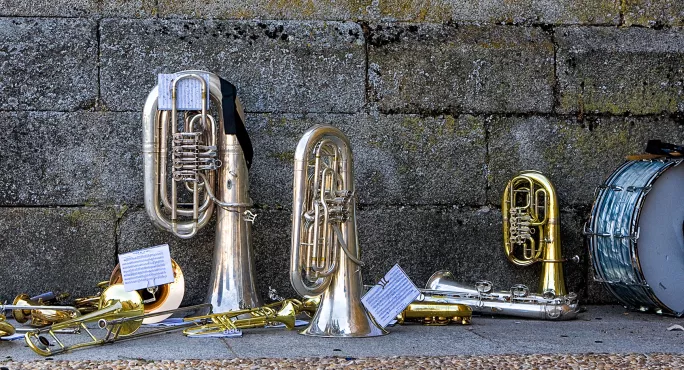Key policy of rooting music tuition in education at risk, warns union

A Scottish council has come under fire over proposals to remove its instrumental music service from education and place it in an arm’s-length trust, as it prepares for “significant reductions in core revenue funding”.
Scotland’s largest teaching union, the EIS, has urged East Ayrshire Council to “step back from the brink” and abandon plans to transfer instrumental music tuition to East Ayrshire Leisure Trust in a bid to save money.
The union’s general secretary, Andrea Bradley, said the plans could have ramifications for all instrumental music teachers currently employed under nationally agreed terms and conditions of service.
‘Music tuition belongs firmly within education’
Ms Bradley also said the plans “fail fundamentally to recognise the vital contribution which [instrumental music tutors] make to educational outcomes for children and young people” and “frustrate key government objectives of rooting instrumental music tuition firmly within education, where it belongs”.
In its 2021 Scottish Parliament election manifesto, the SNP pledged to remove barriers to participation by abolishing fees for music and arts education, “including instrumental music tuition in schools”.
Fees were abolished in 2021 - although there are concerns about funding keeping pace with costs.
The Scottish government, however, also promised mainstream “music as a core subject in Scotland’s education system” and to ensure instrumental music tutors were registered with the General Teaching Council for Scotland to create “a professionally recognised national music teaching force”.
- Research: ‘Huge boost’ in numbers having music lessons
- News: New music platform would ‘transform’ instrumental tuition
- Related: Music education in Scotland ‘diverse but fragile’
Ms Bradley said: “Despite [the government’s] clear policy direction, East Ayrshire Council seems determined to forge ahead with these damaging proposals which will not only jeopardise the professionalism of our members and the quality of music education for the young people in East Ayrshire, but will also apparently frustrate key government objectives of rooting instrumental music tuition firmly within education, where it belongs.
“The EIS is clear that East Ayrshire Council should step back from the brink, reverse these proposals and ensure that instrumental music teachers in East Ayrshire can continue, as part of education, to deliver the high-quality tuition for which they are known and respected, and are afforded the same protection within their employment as their colleagues in local authorities across Scotland.”
Alastair Orr is an instrumental music instructor with over 30 years of experience and has long campaigned for the protection of instrumental music and vocal tuition in schools.
Mr Orr says if the East Ayrshire plan goes ahead it will have “serious potential ramifications across the country” and will “greatly undermine the standing of instrumental and vocal education in Scotland’s schools”.
He added: “It also places staff, who are employed as educators, in the highly vulnerable position of being reliant on their income from a trust or charity, many of which appear to be in an already unstable financial situation.”
East Ayrshire Council is looking to transfer all its instrumental music service staff, who are currently employed under nationally agreed terms and conditions of service, from education to East Ayrshire Leisure Trust.
Budget ‘black hole’ behind proposals
A report to go before the council on Tuesday 18 June 2024 says there is a £3.5 million black hole in the council’s education budget and, if instrumental music service remains in education, it is “at risk of immediate service reduction/savings”.
The report says the advantages of the proposed change include the instrumental music service being sustained and potentially enhanced. However, the report also acknowledges the changes will mean “different pay and grading”, “term time contracts” and “being more remote from education”.
It envisages that the changes - if approved - will be introduced by the start of the 2025-26 school year.
The report says that “throughout the rest of the UK, instrumental music is generally offered through independent music trusts”.
However, in Scotland, the only trust to offer instrumental music is Highlife Highlands. The service was transferred from Highland Council to the local leisure trust in 2018.
The Scottish government was approached for comment but said the decision was a matter for the council.
For the latest Scottish education news, analysis and features delivered directly to your inbox, sign up to Tes magazine’s The Week in Scotland newsletter
You need a Tes subscription to read this article
Subscribe now to read this article and get other subscriber-only content:
- Unlimited access to all Tes magazine content
- Exclusive subscriber-only stories
- Award-winning email newsletters
Already a subscriber? Log in
You need a subscription to read this article
Subscribe now to read this article and get other subscriber-only content, including:
- Unlimited access to all Tes magazine content
- Exclusive subscriber-only stories
- Award-winning email newsletters



